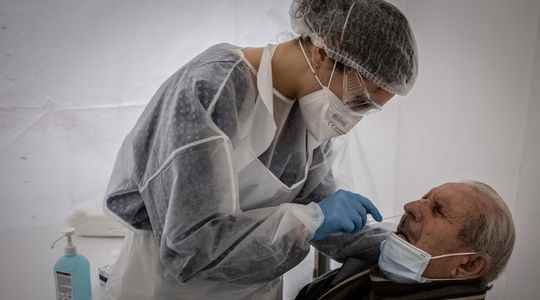The French know the procedure: filling out a short form, presenting your vital card and receiving a white swab in your nose. After a moment of calm, pharmacies and laboratories are again taken by storm during this seventh wave of Covid-19. With more than 3 million PCR and antigen tests validated between June 27 and July 3, compared to just over 2.1 million the previous week, the statistics department (Drees) observes “a sharp increase”. If the number of tests is on the rise “for all age groups” (+ 41%), it is even more marked among 16-25 year olds (+ 58%).
To view the graph, click here.
Unsurprisingly, the increase in tests echoes the strong circulation of the virus at the start of the summer, driven by the Omicron BA.4 and BA.5 sub-variants, now the majority in the territory. A total of 140,997 new cases were recorded on Saturday evening by Public Health France, 45% more than a week earlier.
An epidemic rebound is logically combined with yet another wave of screening, essential for proper monitoring of the health situation, explains to L’Express Yannick Simonin, virologist and research professor at the University of Montpellier. “For now, the tests are giving us some indication, because the downside of the hospitalization numbers is that there is a three-week lag,” he said. While some countries have decided to stop publishing the report on the number of daily cases, such as Luxembourg, France continues to bet on tests as a tool in the fight against the epidemic.
But is this device still effective against new strains? As early as December 2021, US health authorities warned of a lower sensitivity of antigenic tests to Omicron subvariants. “There were probably a few more false negatives with Omicron BA.2 compared to Delta, but there is no difference data between BA.5 and BA.2 at this time (…). We count, for example, on Tuesday, 200,000 positive tests, so the detection threshold is not too bad”, reassures the virologist. As a reminder, the PCR test remains the one that is the most sensitive, because the genetic material present at the level of the sample is amplified in the laboratory – with enzymes.
Different quality tests depending on the pharmacy
However, the quality of the tests can vary from one pharmacy to another. On this aspect, Philippe Besset, president of the Federation of Pharmaceutical Unions of France, confirms that the institutions find themselves “caught between two fires”: on the one hand the need to have a sufficient number of tests, on the other in have quality. Among the tests present on the national market, some are made in China. “They are of lower quality than the European tests, but the latter are not produced in large enough quantities,” he explains.
Each institution decides which tests they wish to purchase. L‘Health Insurance having lowered the cost of testing for pharmacies, some have bought cheap and less effective kits. Chinese tests are less expensive, “between 1.50 and 2.80 euros” per unit, against “3 to 4 euros” for European tests. “On our side, we tried to direct pharmacy purchases towards European tests, but we had our suspenders pulled up by the competition authority”, adds Philippe Besset.
Despite these hazards, the trade unionist encourages the screening strategy in force, which he considers profitable: “It is now that it is useful.” The number of tests must be observed in correlation with the positivity rate, which is very high today (30% are positive on all the tests), which means that we manage to detect people sick with Covid-19.
A statement shared by Christine Rouzioux, professor of virology and member of the National Academy of Medicine, who insists on the need to test oneself or to be tested, including in the presence of small signs (for example a simple cold). She is surprised by a possible debate on the question: “the test works very well and it is functional. For me, the concern is the people who are not going to be tested. It is important for them and their environment.” Especially since the trend is different from that of last summer, when some of the patients came to be tested to update their health pass.
“The fear of congestion” in pharmacies
For two years, antigenic tests have entered the daily life of the French. So much so that they crowd into laboratories and pharmacies, at the risk of sometimes creating a traffic jam at vacation spots. “Pharmacies carry out 90% of the antigenic tests carried out in the city, but all health professionals must get involved if we want everyone to be able to be tested”, answers Pierre-Olivier Variot, the president of the Union of Community Pharmacists (USPO). As a result of the drop in test prices, pharmacies can no longer call on outside people in the event of difficulty. “Compared to this winter, it’s more complicated to organize,” he says.
In addition to a better distribution on the question of tests, the possibility of reducing their number is mentioned in order to lighten the burden on professionals. This would amount to modifying the doctrine in force. “When you test positive, you must repeat the test five days later if you are vaccinated or seven days later if you are not. However, in practice, we realize that at D+ 5 and D +7, the tests are 98% of the positive cases, so perhaps we should stop doing the tests on D+5”, estimates Pierre-Olivier Variot. It should be noted that pharmacies must manage, in parallel, the relaunch of the vaccination campaign intended for the most vulnerable for the second booster dose. Some pharmacies would thus be forced to choose between carrying out tests and vaccinating.
If it is still too early to do without tests, it is difficult to know the evolution of these screening campaigns. “It will depend on the induced severity of the new variants. If the possible BA.6 and BA.7 send a lot to the hospital, everyone will be tested”, concludes Christine Rouzioux.
